 Petzlover
Petzlover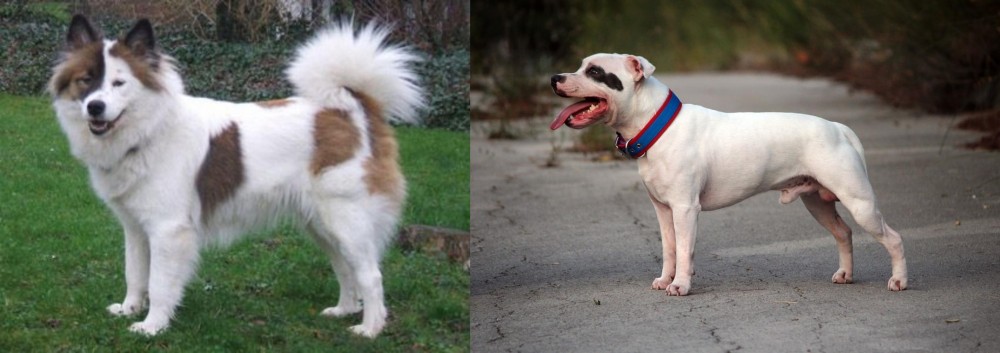 Elo is originated from Germany but Staffordshire Bull Terrier is originated from United Kingdom. Elo may grow 19 cm / 8 inches higher than Staffordshire Bull Terrier. Elo may weigh 18 kg / 40 pounds more than Staffordshire Bull Terrier. Both Elo and Staffordshire Bull Terrier has almost same life span. Elo may have more litter size than Staffordshire Bull Terrier. Elo requires Moderate Maintenance. But Staffordshire Bull Terrier requires Low Maintenance
Elo is originated from Germany but Staffordshire Bull Terrier is originated from United Kingdom. Elo may grow 19 cm / 8 inches higher than Staffordshire Bull Terrier. Elo may weigh 18 kg / 40 pounds more than Staffordshire Bull Terrier. Both Elo and Staffordshire Bull Terrier has almost same life span. Elo may have more litter size than Staffordshire Bull Terrier. Elo requires Moderate Maintenance. But Staffordshire Bull Terrier requires Low Maintenance
 Developed in Germany in 1987, the Elo is a fairly new breed and there are some unique situations surrounding its development. For one thing the Elo Breeding and Research Association has trademarked the breed name, Elo. The use of the name is supervised by the Elo Breeding and Research Association. Secondly, the goal in developing the Elo is the make the best possible pet for a family. The Elo is bred for behaviors rather than appearances, for companionship rather than work.
Developed in Germany in 1987, the Elo is a fairly new breed and there are some unique situations surrounding its development. For one thing the Elo Breeding and Research Association has trademarked the breed name, Elo. The use of the name is supervised by the Elo Breeding and Research Association. Secondly, the goal in developing the Elo is the make the best possible pet for a family. The Elo is bred for behaviors rather than appearances, for companionship rather than work.
The Elo was developed when Marita and Heinz Stories crossed Old English Sheepdogs (Bobtails) with their Eurasiers. They believed that these two breeds were similar in type and development. They were looking to breed a great household pet. The litters from these original crosses were then bred again with Eurasiers or Chow, Dalmatians, and Samoyeds. This expanded the donor base and they continued to breed for character using just the Eurasier, Chow and Bobtail (Old English Sheepdog). Currently there are about 3000 dogs and 60 breeders of Elos. The breed is not really known outside of Germany but that is slowly changing.
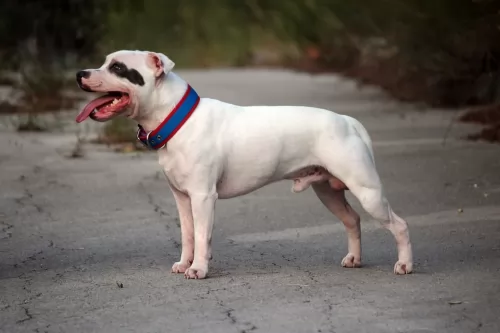 The Staffordshire Bull Terrier was first developed in the northern sections of Birmingham and in Staffordshire, England. The Staffie is a cross between a Black and Tan Terrie and the Bulldog, but had other breeds crossed in over time in order to create a bull-baiting dog and a fighting dog. In the Victorian age these sports were banned but dog fighting went underground and continues on some level today.
The Staffordshire Bull Terrier was first developed in the northern sections of Birmingham and in Staffordshire, England. The Staffie is a cross between a Black and Tan Terrie and the Bulldog, but had other breeds crossed in over time in order to create a bull-baiting dog and a fighting dog. In the Victorian age these sports were banned but dog fighting went underground and continues on some level today.
The Staffordshire Bull Terrier was exceptional at these “sports” due to his build, power and jaw strength. Today’s Staffie is a descendent of those early Bull Terrier crosses. Together with the Bull Terrier and the American Pit Bull, the Staffie also traces its roots back to those original English Bully dogs. All three breeds have the Bulldog in common.
After dog fighting and bull baiting were banned the Stafforshire Bull Terrier was further developed as a companion and pet. Still their reputation as fighting dogs cost them recognition in the official kennel clubs for some time. They finally made the UK registry in 1935, but it was not until 1974 that the American Kennel Club (AKC) accepted them.
 As previously mentioned the Elo is bred for behaviors not appearance and not work. Therefore, the appearance of any one dog can vary greatly. There is a breed standard but there is also a lot of diversity in the breed. The Elos’ body is longer than it is tall and it tail is full and furry. He carries his tail over his back in a curve. The Elo has furry, slightly rounded, wide set ears. The undercoat is dense, and the top coat length can be medium or short.
As previously mentioned the Elo is bred for behaviors not appearance and not work. Therefore, the appearance of any one dog can vary greatly. There is a breed standard but there is also a lot of diversity in the breed. The Elos’ body is longer than it is tall and it tail is full and furry. He carries his tail over his back in a curve. The Elo has furry, slightly rounded, wide set ears. The undercoat is dense, and the top coat length can be medium or short.
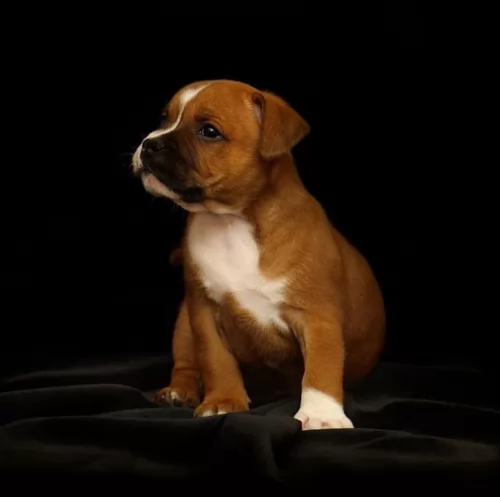 The Staffordshire is a muscular, stocky and unusually strong breed, small to medium size in height and build. They have broad, powerful chests, wide set, strong legs, strong shoulders, broad head with a fairly short muzzle. Their ears are not cropped but they are short and fold over. The coat is stiff, close and short and the tail is medium and carried low. Most Staffies are brown, but they can be red, brindle with white, fawn, black, white or blue.
The Staffordshire is a muscular, stocky and unusually strong breed, small to medium size in height and build. They have broad, powerful chests, wide set, strong legs, strong shoulders, broad head with a fairly short muzzle. Their ears are not cropped but they are short and fold over. The coat is stiff, close and short and the tail is medium and carried low. Most Staffies are brown, but they can be red, brindle with white, fawn, black, white or blue.
 Having been bred to be a companion animal, the Elo loves children, is loyal, playful, obedient and calm. They love to and need to be with their people. These are not independent, think on their own dogs. They depend on their people in order to be happy and well behaved. He is outgoing and friendly with people.
Having been bred to be a companion animal, the Elo loves children, is loyal, playful, obedient and calm. They love to and need to be with their people. These are not independent, think on their own dogs. They depend on their people in order to be happy and well behaved. He is outgoing and friendly with people.
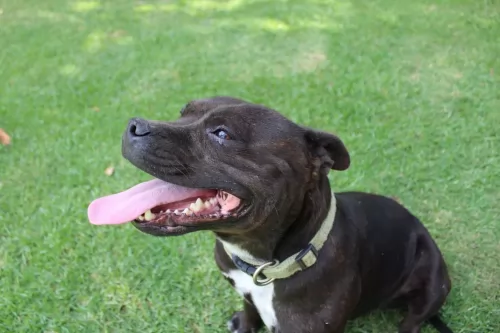 1.Children friendliness The breed adores children but care should still be taken because they are so strong and their jaws are so powerful.
1.Children friendliness The breed adores children but care should still be taken because they are so strong and their jaws are so powerful.
2.Special talents they adore children and they one of the most powerful jaws among canines.
 At this point in time the Elo breed is very young and has a very small population, so the breeding group is small and probably inbred. This can lead to hereditary diseases and the Elo is not immune. However, they are a healthy breed and it seems the major issue is Disticha – an eye disease that causes corneal damage. It causes corneal ulcers, inflammation, scarring and tearing. There are a variety of treatments including surgery
At this point in time the Elo breed is very young and has a very small population, so the breeding group is small and probably inbred. This can lead to hereditary diseases and the Elo is not immune. However, they are a healthy breed and it seems the major issue is Disticha – an eye disease that causes corneal damage. It causes corneal ulcers, inflammation, scarring and tearing. There are a variety of treatments including surgery
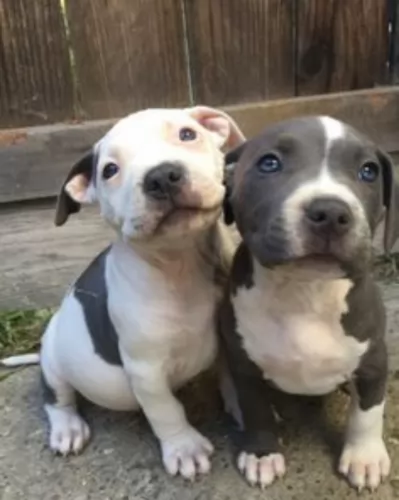 • Patella luxation otherwise known as a slipped kneecap- can cause pain and some lameness.
• Patella luxation otherwise known as a slipped kneecap- can cause pain and some lameness.
• Skin allergies and even a tendency toward Mange which is chronic in some forms and fatal in others.
• Like most active dogs their size, they are susceptible to bloat which can be fatal if not treated immediately.
 The Elo is a non-working family dog so do not over feed them. Use a high quality dry food made for a medium size dog.
The Elo is a non-working family dog so do not over feed them. Use a high quality dry food made for a medium size dog.
As mentioned previously the Elo breed is so young as a breed that there have been very few health studies and the only inherited issue at this time besides the Disticha.
Even though the Elo is a non-working dog, they do require a substantial amount of exercise daily. They need outdoors space to run and play as they are very playful with their family. He loves to go on walks, to run, play and dig. Yes, he can be a digger if he is not provided with appropriate and alternative exercise. Without exercise the Elo can be irritable and display behavior issues.
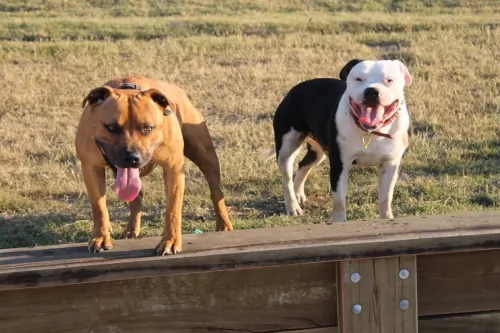 1.Feeding the puppy Don’t over feed as he grows fast. Feed a high quality dog food for medium size puppies. Feed 1-2 and a quarter cups in 3-4 meals per day.
1.Feeding the puppy Don’t over feed as he grows fast. Feed a high quality dog food for medium size puppies. Feed 1-2 and a quarter cups in 3-4 meals per day.
2.Feeding the adult Don’t exercise right before or after eating due to potential for bloat. Feed 1-2 times a day a high quality medium breed dog food.
4. Games and Exercises They are terriers after all and they dig. Need a fairly large yard with a strong fence. They love to play ball, frisbee and can excel at cart pulling.